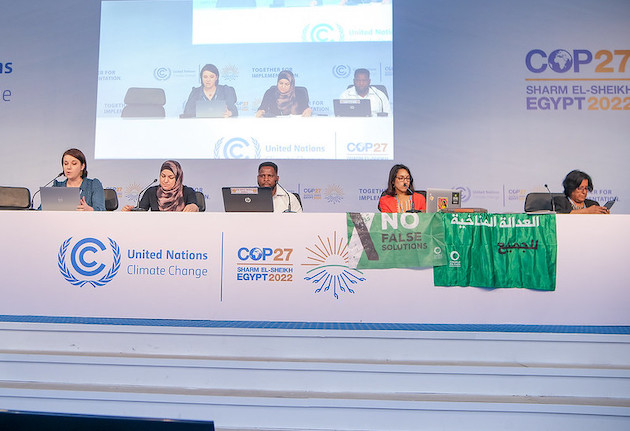At COP27, wealthy governments are pushing for stronger efforts to limit global warming—while failing to deliver the finance and technology promised for climate action in poorer countries, writes Brandon Wu.
It’s a rich irony that the United States, European Union and other wealthy countries are claiming to be climate champions that are trying to “keep 1.5 alive” at the UN climate negotiations (COP27) that will soon come to a close in Egypt.
These are the same countries that have refused to acknowledge their massive historical responsibility for causing the climate crisis, and even now are continuing with plans for massive oil and gas production expansion.
Rather than highlighting this abdication of responsibility from rich countries on a world-historic scale, numerous stories from COP27 have carried the narrative that some developing countries are the problem, by trying to take the 1.5-degree Celsius goal out of COP27 texts.
The implication is that these developing countries – namely larger economies like China – are blocking progress in the climate negotiations for selfish or nefarious reasons.
This is a classic redirection of blame that serves the interest of the countries that are the largest historical emitters, bear the greatest responsibility for addressing the climate crisis, and have for decades avoided that responsibility and failed to act.
It is a manufactured scandal that distracts from the real one: the consistent failure of wealthy countries to reduce their own emissions and provide finance for developing countries for mitigation, adaptation, and now ‘loss and damage’.
Who are the real climate criminals blowing through the 1.5C limit? It’s the developed countries like the United States, who have massive oil and gas expansion plans. Just yesterday, the US approved a new liquefied natural gas terminal on the Gulf Coast with a capacity of 8.4 million tonnes of LNG per year, which will do massive harm to both the climate and local communities.
They know digging up and burning all that oil and gas will leave no chance of keeping under the 1.5-degree limit, yet they refuse to quit their addiction to climate-destroying fossil fuels.
Lack of finance, tech
Developing countries absolutely must also phase out their use of fossil fuels, but this is only possible in the context of global equity. For almost all developing countries, the transition is out of reach without the finance and technology that has been repeatedly promised from developed countries, but never delivered.
Thus, objections from developing countries to the current language emphasising the 1.5-degree goal is fundamentally premised on equity concerns – especially in light of all this developed country hypocrisy. Statements like “all Parties must increase efforts towards 1.5-compatible pathways” are completely devoid of equity.
They erase history, ignoring that developed countries have been polluting for more than 150 years, in favour of putting all countries at the same starting point regardless of their historical emissions or their current levels of development.
Without any equity principles, where is the balance of efforts going to fall? If history is any guide, developed countries will not do their fair share, and will push off their obligations onto the backs of the poor. They will continue with their fossil fuel expansion plans and blow through the remaining carbon budget for a 1.5-degree world, all the while failing to provide the finance and technology developing countries need to have any chance of making just transitions a reality in their own economies.
It is frontline communities in developing countries that will suffer most if we fail to keep under the 1.5-degree limit. And it is climate justice groups that originally pushed for the 1.5-degree goal in the first place, pointing out in no uncertain terms that a 2-degree goal would be a death sentence for countless people.
Let’s be clear on what is happening here. Wealthy countries have hijacked the narrative around the 1.5-degree limit, removed it from the context of equity and history, and weaponised it against developing countries.
No country is blameless in this crisis, but the focus of our ire should fall squarely on those who have been failing for decades to do their fair share, and who even now are denying that failure and pushing it off onto the poor.
Brandon Wu is ActionAid USA’s Director of Policy and Campaigns. He oversees ActionAid’s research, advocacy, coalition building and campaigning work on issues such as food security, land rights, biofuels and more. He personally leads ActionAid’s work on international climate justice, approaching the problem of climate change from the perspective of sustainable development and rights of impacted people. His work in this capacity has focused on climate finance for developing countries, fairness and equity in the global climate regime, and energy democracy in the Global South.
This story was published with permission from Thomson Reuters Foundation, the charitable arm of Thomson Reuters, that covers humanitarian news, climate change, resilience, women’s rights, trafficking and property rights. Visit https://www.context.news/.
Original source: Eco-Business
Image credit: Some rights reserved by Friends of the Earth International, flickr creative commons

